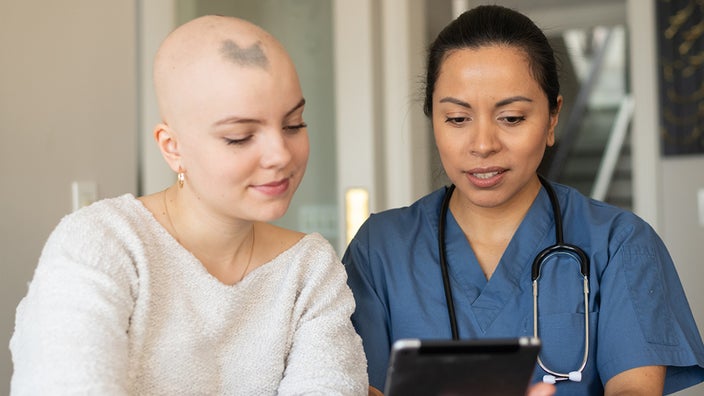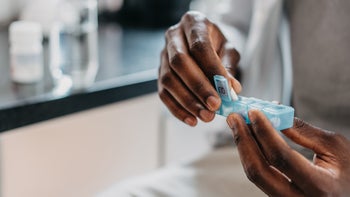
Alopecia Treatments: FDA-Approved Medications and Clinical Trials Underway
Key takeaways:
Alopecia areata can develop when your immune system starts attacking your hair follicles. It can cause inflammation and gradual hair loss.
Olumiant (baricitinib) and Litfulo (ritlecitinib) are once-daily pills that are FDA approved to treat severe alopecia. Olumiant is meant for adults, while Litfulo is an option for people ages 12 years and older. Leqselvi (deuruxolitinib) is a twice-daily tablet for adults with severe alopecia.
Pharmaceutical companies are working on making new alopecia treatments. Some are in advanced phase 3 trials and could be approved in the not-so-distant future. Many more are in earlier stages of development.
Access savings on related medications
Table of contents

In 2017, about 100 people affected by alopecia areata (“alopecia”) shared their personal experiences with an FDA expert panel. Many people voiced their frustrations about the current treatment options for alopecia. Understandably, too. As a health condition that causes hair loss, there are many emotional and physical challenges of living with alopecia.
As time has progressed, alopecia advocates like these are starting to be rewarded for their efforts. In June 2022, the FDA approved the first oral medication for alopecia. Two more followed suit in 2023 and 2024, respectively. And more alopecia treatment options may be on the way.
Alopecia itself is a form of hair loss. It’s thought to be a type of autoimmune disorder, but environmental factors can also play a role. Hair loss usually starts out patchy, with circular areas of hairlessness. It can happen anywhere on your body that grows hair (including eyebrows and eyelashes), but it usually starts at the scalp. Many people regrow their hair, but others do not.
Search and compare options
Here, we’ll cover the latest medications being researched for alopecia and how they stack up to current treatments.
What are the current treatments for alopecia areata?
There’s currently no cure for alopecia. But people living with alopecia still have several treatment options to consider trying.
Olumiant
Olumiant (baricitinib) is an oral tablet that’s taken once daily. It’s a Janus kinase (JAK) inhibitor that helps calm inflammation. It was originally approved to treat rheumatoid arthritis (RA) back in 2018, but it’s gained a couple more uses since then.
Olumiant was approved to treat certain hospitalized adults with COVID-19 in May 2022. Then, in June 2022, the FDA approved it to treat adults with severe alopecia. Olumiant was the first oral treatment option to be fully approved for alopecia.
Olumiant’s approval for alopecia is discussed in another GoodRx Health article.
Litfulo
Litfulo (ritlecitinib) is a once-daily oral capsule. Another JAK inhibitor, it’s approved to treat severe alopecia in adults and kids ages 12 years and older. Litfulo is the first oral medication for adolescents with severe alopecia.
Litfulo and Olumiant work in a similar way. And they both promote scalp hair growth after several months of use. If age isn’t a factor, the best choice between the two may depend on your preferences, what’s available in your area, and cost.
An alopecia story: One woman shares her experience living with alopecia areata and why she’s passionate about providing resources and support.
An innovative way to regrow hair: Discover more about what Olumiant (baricitinib) is and how it treats alopecia.
Janus kinase (JAK) inhibitors on the way: JAK inhibitors are promising medications for alopecia and beyond. Here’s a list of JAK inhibitors that are making their way through clinical trials.
Leqselvi
Leqselvi (deuruxolitinib), another JAK inhibitor, is a twice-daily tablet. It’s a third option for adults living with severe alopecia.
Leqselvi was approved in July 2024. But it hasn’t launched commercially yet. A specific release timeline hasn’t been released yet. Make sure to check back with GoodRx for updates.
Off-label treatments
Olumiant, Litfulo, and Leqselvi aside, many medications are used off-label to treat alopecia. Since alopecia happens when your immune system starts to attack your hair follicles, many of these medications work by calming it down. This gives your hair a chance to grow back.
The best treatment(s) depend on your age, the affected parts of your body, and the severity of your symptoms.
Off-label treatments for mild alopecia include:
Topical minoxidil (Rogaine)
Topical corticosteroids such as clobetasol
Injectable (intralesional) corticosteroids such as triamcinolone
Off-label treatments for moderate-to-severe alopecia include:
Oral minoxidil
Oral corticosteroids such as prednisolone
Topical or contact immunotherapy
Dupixent (dupilumab)
Xeljanz (tofacitinib)
Alternative therapies are another option. They have less supporting data, but some people find them to be helpful. If you’re looking for another option, consider asking a healthcare professional about:
Cryotherapy
Aromatherapy with essential oils
Garlic extract
Onion juice
Anthralin
Which companies are working on developing treatments for alopecia areata?
Researchers have been working hard to find new and improved treatment options for people living with alopecia. It’s a significant area of growth, and over 100 clinical trials are currently underway.
One medication class of particular interest are JAK inhibitors. JAK inhibitors target a specific inflammatory pathway to promote hair growth in people with alopecia.
Let’s take a look at three JAK inhibitors that are leading the pack in clinical trials, following in Olumiant, Litfulo, and Leqselvi’s footsteps.
Rinvoq
Rinvoq (upadacitinib) is already approved for several inflammatory health conditions. It treats moderate-to-severe RA, eczema, ulcerative colitis, and more. Severe alopecia may join this list of approved uses down the line.
This oral tablet’s ability to treat alopecia is being studied in a phase 3 clinical trial. The study started in late 2023, and it’s set to run through January 2028. Rinvoq is made by AbbVie.
Gecacitinib
Suzhou Zelgen Biopharmaceuticals is developing their own JAK inhibitor, called gecacitinib — formerly known as jaktinib. It’s a twice-daily oral medication for severe alopecia.
Gecacitinib was most recently studied in two phase 3 clinical trials (Study 1, Study 2) in China. Study results haven’t been publicly announced yet, but they wrapped up in 2023 and 2024, respectively. The manufacturer is now working on phase 2 trials in the U.S. for gecacitinib.
A topical version of gecacitinib is being developed as well, but it's not as far along as the tablet. It’s a cream that’s being evaluated for mild-to-moderate cases of alopecia.
Ivarmacitinib
Ivarmacitinib is another JAK inhibitor in the works for severe alopecia in adults. It’s a once-daily tablet from Reistone Biopharma.
Researchers shared early phase 3 results at a U.S. dermatology conference in March 2025. So far, ivarmacitinib appears to be significantly more effective than a placebo at helping people regrow scalp hair.
That said, it’s not yet clear if or when Reistone will apply for FDA approval. Right now, the manufacturer is prioritizing ivarmacitinib’s development in China.
If eventually approved in the U.S., ivarmacitinib would become another oral treatment option for severe alopecia alongside Olumiant, Litfulo, and Leqselvi.
Other drug classes
JAK inhibitors aren’t the only alopecia medications in development. Here’s a summary of other notable options that are making their way through clinical trials.
Medication | Description | Development stage |
|---|---|---|
Coacillium (LH-8) | Topical solution for moderate-to-severe alopecia in kids and teens | Phase 2/3 |
Diphenylcyclopropenone (DPCP) | Immunotherapy ointment for extensive alopecia in adults | Phase 3 |
Under-the-skin injection that’s given every 2 weeks for severe or very severe alopecia in adults | Phase 2 | |
Once-weekly intravenous (IV) injection for moderate-to-severe alopecia in adults | Phase 2 | |
Oral pill for moderate-to-severe alopecia in adults | Phase 2 | |
Under-the-skin injection that’s given every 2 weeks for severe or very severe alopecia in adults | Phase 2 | |
Once-monthly, under-the-skin injection for severe alopecia in adults | Phase 2 |
Why is alopecia areata so difficult to treat?
Many of the medications listed above may improve hair growth for some people with alopecia, but not everyone. For others, it can be a trial-and-error process until they find something that works.
Some alopecia medications can cause serious, sometimes dangerous side effects. As a result, some healthcare professionals think certain medications might be too risky and costly to be used for hair regrowth. A healthcare professional can tell you which treatment options are safe for your situation.
Health experts are currently looking at additional medication options that can promote hair growth and limit bothersome side effects.
The bottom line
Olumiant (baricitinib), Litfulo (ritlecitinib), and Leqselvi (deuruxolitinib) are oral medications that are FDA approved to treat severe alopecia. No medications are currently approved to treat less severe cases of the condition; most alopecia treatments are used off-label. Medications like Rinvoq (upadacitinib), gecacitinib, and bempikibart are being studied in alopecia clinical trials.
If you have questions or concerns about alopecia areata treatments, it’s recommended to talk to a healthcare professional.
Why trust our experts?


References
BioSpace. (2025). Alopecia areata market expected to grow at a CAGR of 6.12% during 2025-2035. Emotional and psychological impact drives demand for alopecia areata treatment.
Center for Drug Evaluation and Research. (2018). The voice of the patient: Alopecia areata. U.S. Food and Drug Administration.
ClinicalTrials.gov. (n.d.). Search results: Alopecia areata | Not yet recruiting, recruiting, active, not recruiting, enrolling by invitation studies. National Library of Medicine.
ClinicalTrials.gov. (2024). A study with jaktinib hydrochloride cream applied topically to subjects with alopecia areata (AA). National Library of Medicine.
ClinicalTrials.gov. (2024). DPCP for the treatment of alopecia areata. National Library of Medicine.
ClinicalTrials.gov. (2024). Safety and efficacy of oral NXC-736 in adult participants with moderate and severe alopecia areata. National Library of Medicine.
ClinicalTrials.gov. (2025). A phase 2B study to evaluate rezpegaldesleukin (rezpeg) in the treatment of severe to very severe alopecia areata in adult patients (rezolve aa). National Library of Medicine.
ClinicalTrials.gov. (2025). A study to evaluate the efficacy and safety of subcutaneous amlitelimab monotherapy compared with placebo in adult participants with severe alopecia areata. National Library of Medicine.
ClinicalTrials.gov. (2025). A study to evaluate the safety and effectiveness of upadacitinib tablets in adult and adolescent participants with severe alopecia areata (Up-AA). National Library of Medicine.
ClinicalTrials.gov. (2025). Extension study to evaluate safety and efficacy of jaktinib in adults with alopecia areata (AA). National Library of Medicine.
ClinicalTrials.gov. (2025). Study to evaluate the safety and efficacy of jaktinib in adults with alopecia areata (AA). National Library of Medicine.
Eli Lilly and Company. (2022). FDA approves Lilly and Incyte's Olumiant (baricitinib) as first and only systemic medicine for adults with severe alopecia areata.
Equillium. (2024). Equillium announces positive topline data from phase 2 study of EQ101 in alopecia areata.
Grasso, G. M. (2023). Coacillium solution sustains adolescent alopecia areata improvement post-treatment. Healio.
Hwang, A., et al. (2022). Complementary and alternative therapies for alopecia areata. Journal of Integrative Dermatology.
National Alopecia Areata Foundation. (n.d.). Available treatments.
National Alopecia Areata Foundation. (2024). Sun Pharma’s Leqselvi released from patent litigation hold.
Q32 Bio. (2025). Q32 Bio presents results from SIGNAL-AA part A clinical trial evaluating bempikibart in patients with alopecia areata at the 2025 American Academy of Dermatology meeting. PR Newswire.
Sun Pharmaceutical Industries. (2024). Leqselvi (deuruxolitinib) tablets, for oral use [package insert].
Sun Pharmaceutical Industries. (2024). U.S. FDA approves Leqselvi (deuruxolitinib), an oral JAK inhibitor for the treatment of severe alopecia areata. PR Newswire.
Tirmizi, S. S., et al. (2025). Efficacy of oral tofacitinib in alopecia areata, alopecia totalis, and alopecia universalis. Cureus.
Viguers, S. C. (2025). Ivarmacitinib ‘potential new option’ for adults with severe alopecia areata. Healio.
Wang, E. H. C., et al. (2018). Montagna symposium 2017 - Janus Kinase inhibitors for treatment of alopecia areata. The Journal of Investigative Dermatology.
Yan, T., et al. (2024). Comparative efficacy and safety of JAK inhibitors in the treatment of moderate-to-severe alopecia areata: a systematic review and network meta-analysis. Frontiers in Pharmacology.
Zelgen. (n.d.). Pipeline.














